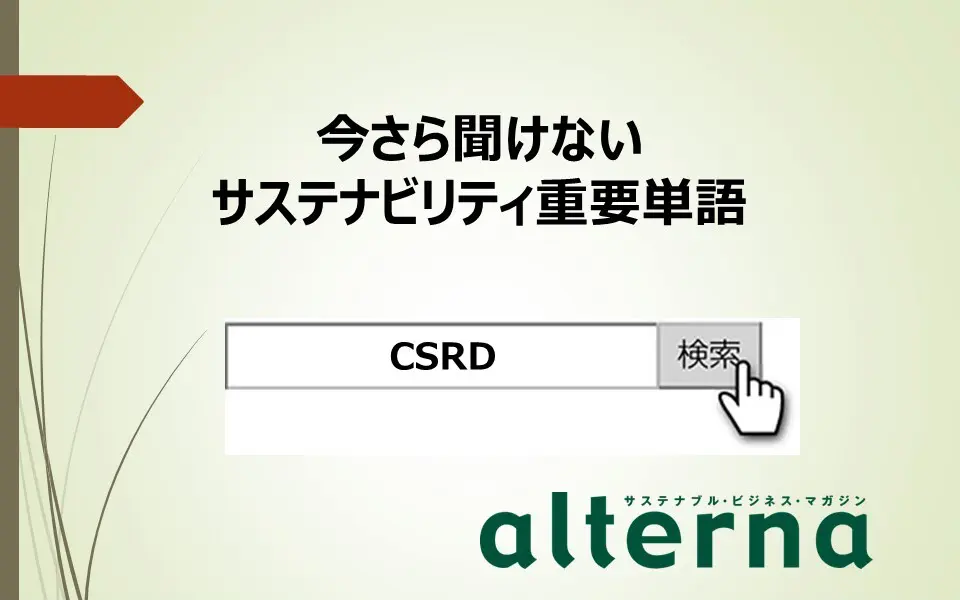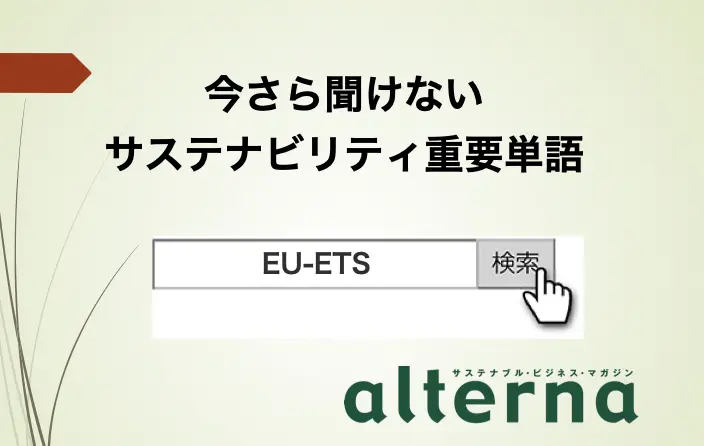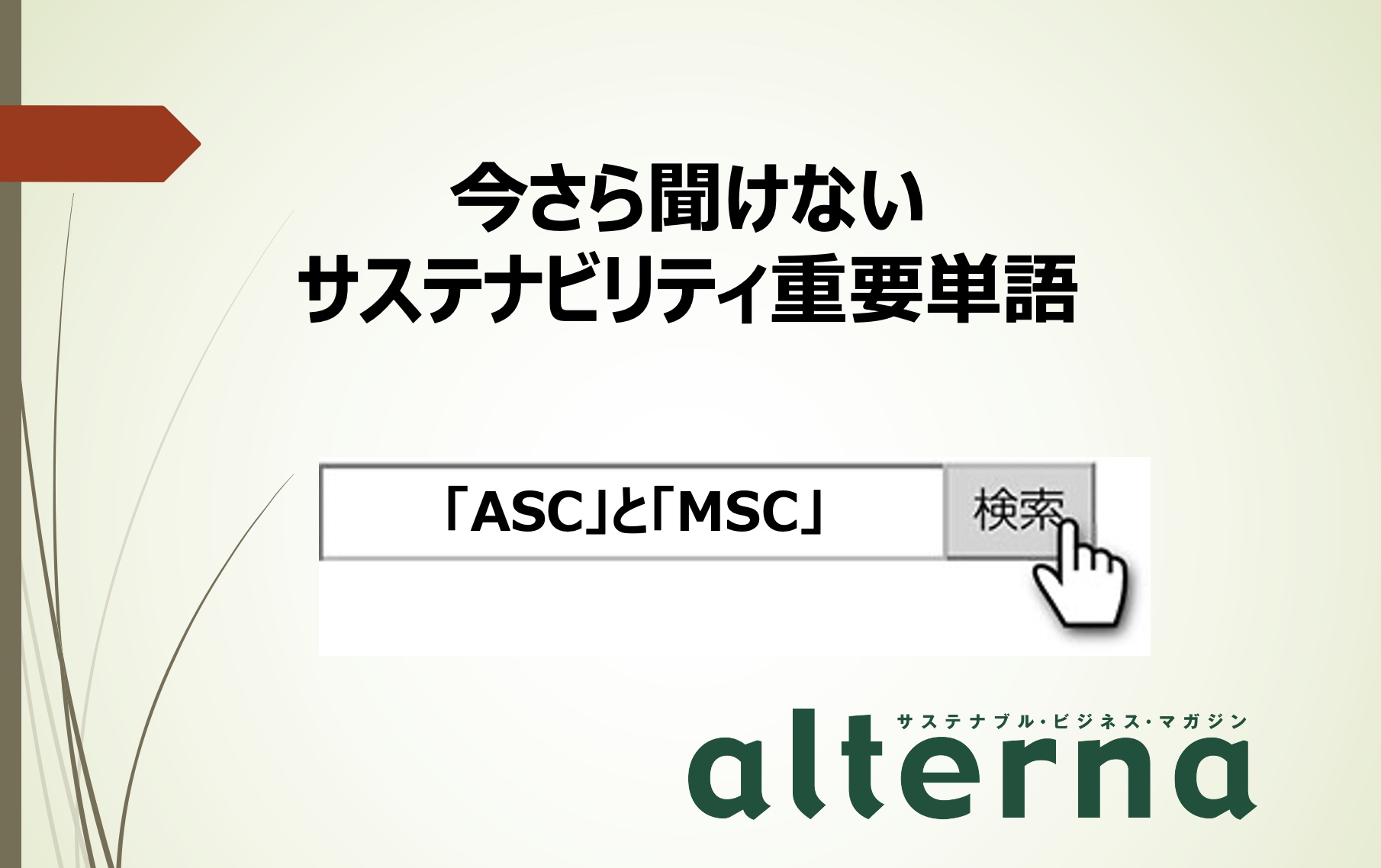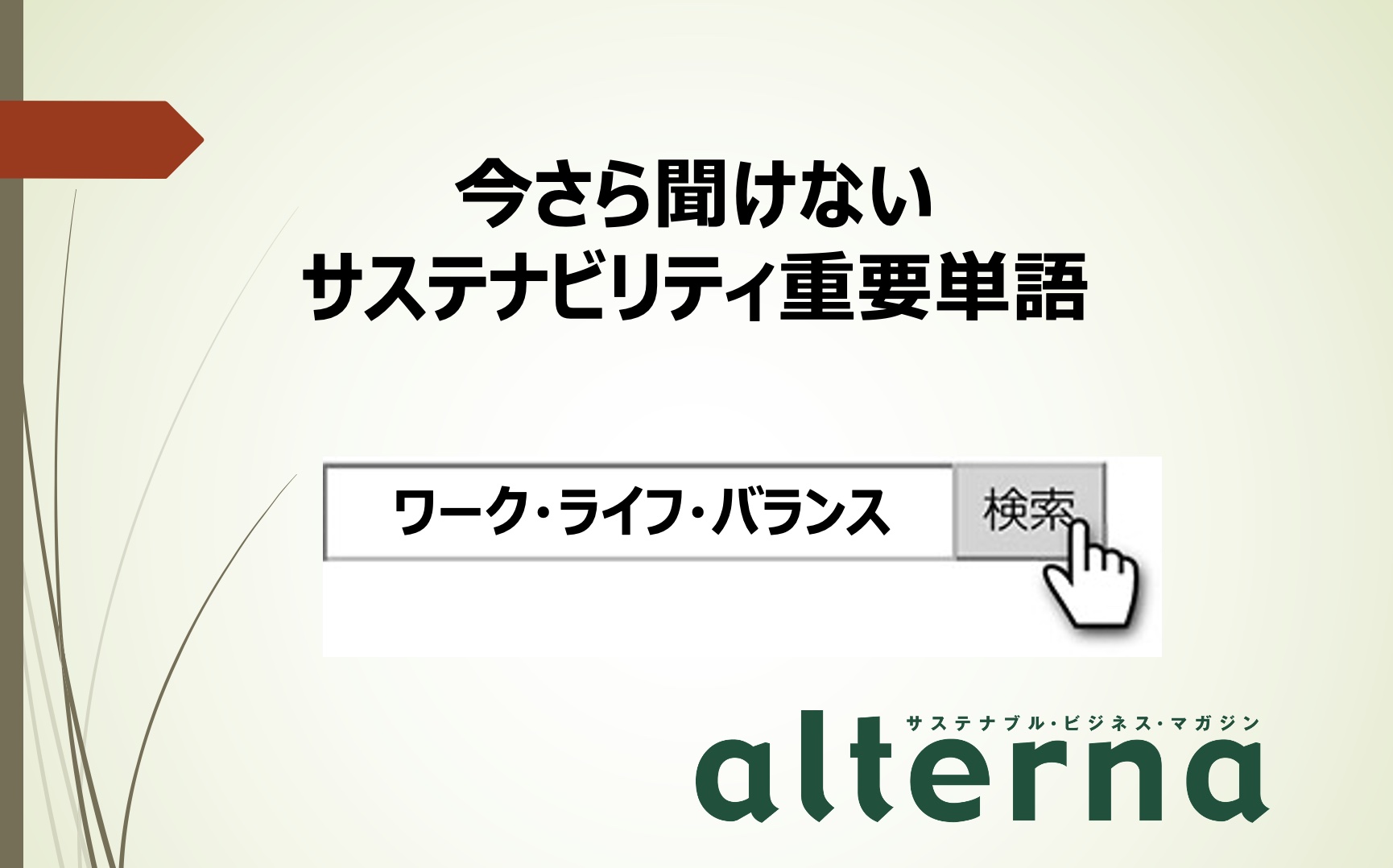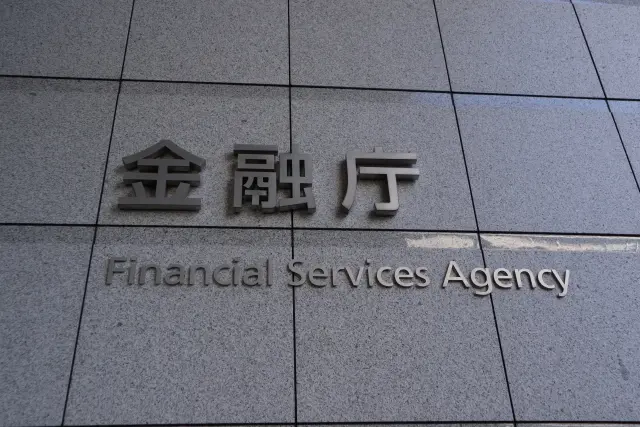■オルタナ式英単語:“What is an NGO/NPO?“
皆さんこんにちは! 朝晩、秋の気配を感じるころになりましたね。今月はLesson23 “What is an NGO/NPO?“「NGO/NPOとはどんな存在か」を取り上げます。重要単語が多く出てきますので、この機会に覚えていきましょう。
【語注】
・exacerbate 悪化させる
・depopulation 過疎化
・disparity 格差
・those in need 生活困窮者たち
・one-size-fits-all 画一的な
・decentralization 地方分権
・grant 許可する、与える
・amend (規則を)改正する
・certification 認定
・full-scale 全面的な、本格的な
・spontaneous 自発的な
As our society becomes more diverse, our living environment is constantly changing. Changes in local communities exacerbate many problems such as depopulation and low fertility rates in rural areas, as well as problems related to child rearing and those in need in urban areas. At the same time, the disparity between rural and urban areas is widening.
【訳】
社会が多様化するとともに、私たちの生活環境は絶えず変化しています。地域社会における変化は、地方部では過疎化や少子高齢化、都市部では子育てや生活困窮者の問題を生み出しています。同時に地方部と都市部の格差はさらに広がりつつあります。
Fertilityは受胎能力、出生率。受精率をさします。low fertility ratesは「少子化」です。文脈によっては、fertilityのみで「少子化」を意味することもあります。(たとえばfertility crisis は「少子化危機」)
Exacerbateは、言い換えれば make worse, worsen です。「悪化する、鈍化する、減少する」など「ネガティブなほうに変わる」ことを示す語(たとえば、weaken, deteriorate, decline, fall, drop)をまとめて覚えておくとよいでしょう。一緒に、逆の意味(ポジティブなほうに変わる)についても整理しておくと語彙力がさらに伸びますよ。
It is impossible to solve those problems only with the one-size-fits-all measures. The government has been actively promoting new policies including decentralization in order to address local issues with measures tailored to each region. However, there are many problems that cannot be solved by administrative measures and corporate services based on conventional efforts alone. Now, new initiatives are needed. Against this backdrop, there are increasing expectations on non-governmental organizations (NGOs) and non-profit organizations (NPOs) to help citizens take the initiative and work towards solutions.
【訳】
従来の画一的な施策だけでこれらの問題を解決することは不可能である。政府は地域の問題についてそれぞれの地域にあう対策で取り組むことができるように、地方分権をはじめとする新たな施策を積極的に進めています。しかし、従来の取り組みをベースとした行政施策や企業のサービスだけでは対応しきれない課題も多く、新たな取り組みが求められます。そのようななかで、市民が自発的に自らの発意を基に、解決のための取り組みを行う、NGOやNPOへの期待はますます大きくなっています。
measures は「対策」。この意味では複数形になります。
conventional は「伝統的な、従来の」ですが、「型にはまった、ありきたりの」といった、ネガティブな意味合いで用いられることが多いです。
against this backdrop は「~を背景に(して)」。使いやすい表現ですので覚えておきましょう。
1998年の特定非営利活動促進法が契機に
The 1998 Law for the Promotion of Specified Non-Profit Activities (NPO Law) was enacted in 1998 to respond to these social changes by granting NPOs a corporate status in order to enhance their social positioning. As of the end of September 2018, there are more than 51,700 organizations with this corporate status. At the time when the NPO Law was first enacted, the emphasis was on granting corporate status, but later, in order to encourage the maintenance and continuation of organizations, the Certified Non-Profit Corporation System (Certified NPO System) was established in October 2001 (as of the end of September 2018, there were 1083 organizations)
【訳】
このような社会の変化に対応すべく、NPOに法人格を付与することにより社会的な位置づけを高めようと、1998年に特定非営利活動促進法が施行されました。2018年9月末現在、法人格を有する団体は5万700を超えています。NPO法の施行当初は、法人格を付与することに重きがおかれたものでしたが、その後、団体の維持・継続を後押しするために、税制優遇制度である認定特定非営利活動法人制度(認定NPO法人制度)が2001年10月に開設されました。(2018年9月末現在、1083法人)
As of は「~日現在で」。契約書でも用いられますね。corporate status は「法人格」です。「法人格を得る」であればこの grant のほか、obtain や acquire などが使えます。
認定NPO法人制度について概要はこちらをご覧ください。認定制度について | NPOホームページ (npo-homepage.go.jp)
In 2011, after the Great East Japan Earthquake, NPO Law was amended and the requirements for certification were greatly relaxed, and the system has become as good as any other country in the world to support NPO activities. Coupled with the full-scale reform of the public interest corporation system that took effect in 2008, a system that encourages citizens to engage in spontaneous and socially responsible activities has greatly expanded in Japanese society.
【訳】
その後、東日本大震災が起こった2011年には、NPO法の改正及び認定NPO法人制度の認定要件の大幅緩和が行われ、NPOの活動を下支えする制度として諸外国にも劣らないものとなりました。2008年から本格的に実施された公益法人制度改革をあいまって、市民の自発的で社会的な取り組みを後押しする制度が日本社会に大きく広がりました。
relax はいわゆる「リラックス」というイメージが強いかもしれませんが、規制緩和や要件緩和の意味合いでも使えます。
take effect は「効果が表れる」ですが、法や取り決めなどが主語であれば「発効する、実施される」となります。
行政では解決できない課題にNPOが挑戦
NPO Law limits the definition of specific non-profit activities to a limited field of activity. When it was first enforced, it had 12 items, including “activities to promote health, medical care or welfare,” “promotion of social education,” “promotion of community development,” and “sound upbringing of children.” After revised several times, it includes “activities to revitalize economic activities,” “promotion of rural, mountainous, fishing, and mountainous areas,” and “promotion of agriculture, mountainous, and fishing villages and mountainous areas.”. The number of items has now expanded to 20 with the above-mentioned additions.
【訳】
NPO法では、特定非営利活動の分野を限定して示しています。施行当初は「保険、医療または福祉の増進を図る活動」「社会教育の推進を図る活動」「まちづくりの推進を図る活動」「子どもの健全育成を図る活動」などの12項目でしたが、幾度かの改正により、経済活動の活性化を図る活動や農山漁村または中山間地域の振興を図る活動」などが新たに加わり、現在は20項目となっています。
above-mentioned は「上記の」。ちなみに「下記の」はbelow-mentioned となります。
While some of these activities are conducted overseas, such as in developing countries, a high percentage of organizations engage in activities that are more closely linked to people’s daily lives, such as addressing issues and inconveniences in everyday life, such as nursing, child care, and education, or addressing issues in local communities, such as depopulation, poverty, and environmental conservation. This indicates the spread of and expectations for “mutual aid” (i.e. citizen help), in which citizens themselves work on issues that cannot be solved by conventional social mechanisms such as public help (i.e. government services) and self-help.
【訳】
その活動の内容は、途上国など海外での取り組みもありますが、介護、子育て、教育など身近な市民生活での課題や不自由さ、あるいは過疎化、貧困、環境保全など地域社会の課題への取り組みといった生活密着型の活動をおこなう団体の割合が高くなっています。これは、従来型の社会のしくみである「公助(行政サービス)」や「自助(当事者自らの力)」では解決できない課題に対して、市民自ら取り組む「共助(市民の助け合い)」の広がりと期待を示すもので、それを実証した例として、東日本大震災におけるNPOの多様な取り組みが挙げられます。
「公助、共助、自助」はとくに災害への備えのありかたとして取り上げられています。地方自治体等でも、これら3つの連携の必要性について呼びかけを進めています。災害の規模が大きくなると、公助だけは対応しきれず、共助、自助が重要となります。
i.e.は「つまり」that is ですね。(声に出して読むときもi.e.は that isと読むことが多いようです)
他セクターとの連携が今後の課題
Based on the experiences of the twenty years since the enactment of the NPO Law, collaboration with other sectors on issues is progressing and NPOs are involved in a wide range of activities, and their specific initiatives become more diverse. However, in order to promote the creation of a sustainable society, it is not sufficient for NPOs to work to solve social problems. It is also necessary that they work together closely with other sectors such as government and business. As a partner in promoting the Sustainable Development Goals and CSR, and as a collaborator in the implementation of government policies, society’s expectations of NPOs are increasing.
【訳】
NPO法の施行から20年が経過した現在、NPOの活動分野は多岐にわたり、また具体的な取り組みもさらに多彩になり、NPOは市民の行う自由な社会貢献活動として定着しつつあるといえます。しかし持続可能な社会づくりを進めていくためには、NPOだけが社会課題の解決に取り組むのでなく、行政や企業と言った他セクターと連携していくことがさらに必要とされています。企業のSDGsやCSR推進のパートナーとして、行政の施策実施の協力者として、NPOへの期待はますます高まっています。
実際に、NPO側から企業に対する情報発信や働きかけの事例は増えています。デロイトトーマツコンサルティング合同会社Social Impact Officeマネージャー 金辰泰氏との鼎談で、NPO 法人ACE事務局長/共同創業者 白木朋子氏は、森永製菓との連携事例について話すなかでこう述べています。
「従来の寄付をいただく関係性から、形が変わってきています。企業の本業の強みと私たちのスキル、お互いの強みを掛け合わせて、世の中に必要なものを提供していくという方向に進んでいる」
同じ鼎談で、公益財団法人WWFジャパン自然保護室プラスチック政策マネージャー シーフード・マーケット・マネージャー 三沢行弘氏は「WWFでは、環境保全において企業を非常に重視しています。企業は生産活動をし、消費者との窓口も担っているからです。生産から消費まで一連の動きを変えることができるため、企業と一緒に取り組む効果が特に大きいです」と述べています。
企業ともっと腹を割って話したいーーNPO/NGOが提案する企業との連携 | サステナブル・ブランド ジャパン | Sustainable Brands Japan
NPOと企業の協働については、来月取り上げます。ということで、今月はここまでです。また来月お目にかかりましょう。









-1-scaled.jpg)

-scaled.jpg)







